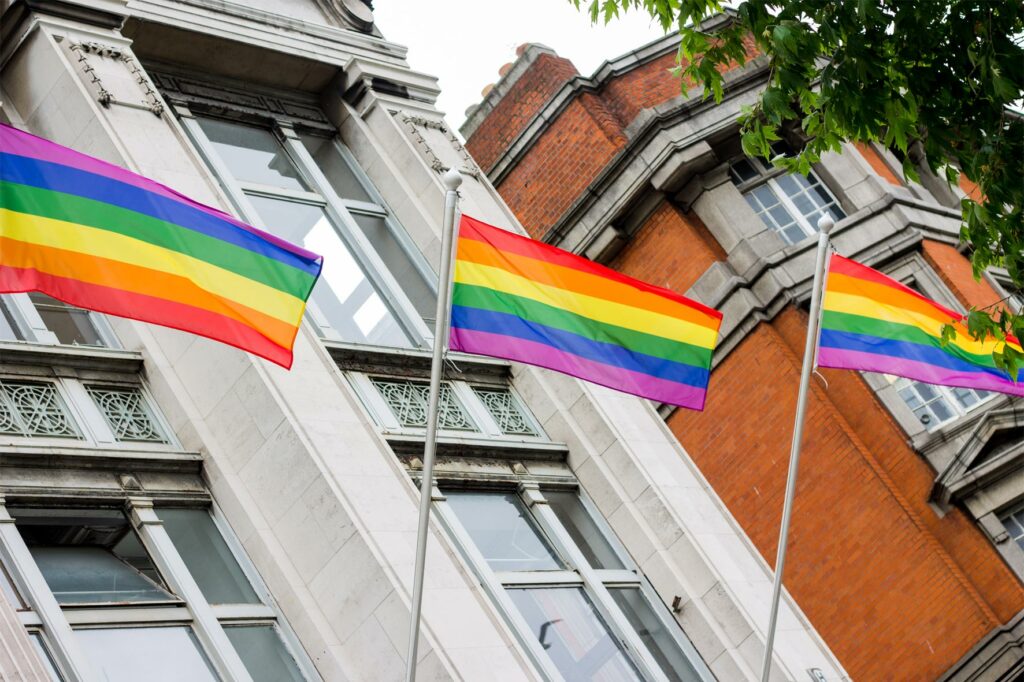The Catholic Church and sex education in Ireland
The Catholic Church and sex education in Ireland
The introduction of a new Catholic relationship and sex education programme in Ireland has reignited debates over religion’s influence on understandings of relationships, sexuality, and LGBTQ+ issues.
Mounting tension
In Ireland, the influence of the Catholic Church throughout society is still greatly felt, particularly in the education sector where 90% of all national schools in Ireland are under Catholic organisation and have a Catholic ethos.[1] This influence is not without its criticism, especially when it comes to the subject of relationships and sex education (henceforth referred to as RSE).
These tensions were put under the spotlight once again in April 2021 when the Irish Bishops’ Conference published a new RSE programme for children aged 4-12.[2] The introduction of this updated Catholic RSE, entitled Flourish, has sparked debate over religion’s influence on understandings of relationships, sexuality, and teachings about LGBTQ+ issues.[3] This article will detail the new Flourish programme, reflect on its criticisms, and on what the future of RSE in Ireland may be.
A moralistic approach
For much of the first part of the 20th century, Catholic moral teaching was the ‘dominant framework’ in which most people learnt about relationships and sex and education.[4] RSE in schools was seen as having an “unrealistic focus on zero tolerance abstinence.”[5] However, the latter part of the century saw significant changes in Irish attitudes towards sexual issues and major changes in legislation in relation to artificial contraception (1993), same-sex marriage (2015), and abortion (2018) which reflected these changing attitudes.[6]
Considering this, Flourish makes a point of acknowledging the importance of teaching Catholic RSE “in a way that is relevant to a changing Ireland” and that when teaching RSE, teachers must “speak a language suited to today’s children and young people.”[7] Therefore, Flourish could be seen as an attempt to emphasise the Catholic Church’s awareness of a changing Ireland and the need to adapt its RSE teachings accordingly.
The teachings of Flourish
Since 1995, RSE programmes have been a required component of primary and secondary school levels.[8] Because of this, Flourish is a non-mandatory, supplementary RSE programme that will be available for use in Catholic primary schools. The programme is separated into different strands covering themes such as self-identity, growing, and changing for younger students, with the added topics of puberty, love, sex, and consent for older students.[9]
At first glance, Flourish does not appear much different to other secular RSE programmes. However, in the introduction, some key elements make it distinctly Catholic in nature. The whole programme is based on ‘the teachings of Jesus Christ and reflect[s] the dignity of each person created in the image and likeness of God’.[10]
Moreover, an emphasis on moral education is evident. The introduction states how RSE must be taught in Catholic schools ‘with reference to moral decision-making. It cannot be taught in some morally neutral way, since this would disregard the sacredness and dignity of each human being as a child of God’.[11]
Under fire
Despite the attempts of the Irish Bishops’ Conference to produce a more socially aware and modern RSE programme, Flourish has received significant criticism.
Firstly, the main backlash has been in reaction to the statement that sex “belongs in a committed relationship” and the Catholic Church’s teaching in relation “marriage between a man and a woman cannot be omitted.”[12] Moreover, the section ‘Keeping Safe’ encourages children to recite the ‘Angel of God’ prayer when they face difficulty with relationships or sexuality.[13] The National LGBT Federation has criticised Flourish, emphasising that
RSE should be “fully LGBT-inclusive” and “rooted in equality.”[14]
Flourish has also received criticism from politicians including Solidarity TD[15] Mick Barry, who explains how the statement that marriage is reserved for heterosexual couples could be “harmful” to LGBTQ+ children.[16] Moreover, in light of Flourish’s publication, the Deputy Prime Minister, Leo Varadkar,[17] has stated that all schools must include ‘non-bias teaching on LGBTQ+ relationships’ and that any RSE teaching that can prioritise one sexual orientation should be condemned in any modern republic.[18]
Furthermore, beyond specific condemnation of Flourish’s preference for heterosexual relationships, parents have expressed concern about having little choice over the RSE their child receives. Considering the vast majority of primary schools have a Catholic ethos, there is a high likelihood non-Catholic parents have to send their children to Catholic schools where they may receive Flourish’s RSE teachings, including that sex and puberty are both “gifts from God.”[19] This has led a group of parents in Cork to express their concern about the “potential and lasting impact the Flourish programme may have on our children’s wellbeing” and begin to develop their own objective-free syllabus which removes religious ethos from RSE.[20]
The future of RSE in Ireland
It is clear that the publication of and reactions to Flourish are reflective of tensions within Irish society. In particular, Flourish has once again brought debates over the continued influence of the Catholic Church over RSE education in the majority of schools to the floor. Despite an attempt to create a more self-aware RSE programme, Flourish has faced significant disapproval from politicians, campaigners, and parents who believe that such a moralistic RSE programme could be harmful, especially for LGBTQ+ children, and that it does not have a place in modern Irish society.
Considering this, what may the future hold for RSE in Ireland? According to columnist Fintan O’Toole, Ireland cannot have “proper sex education while the Catholic Church controls schools.”[21] Moreover, for Irish politician Lynn Ruane, the current Education Act of 1998 must be amended to “prevent religious ethos from potentially hindering the effective, objective and factual teaching” of RSE.[22] As a recent survey of Irish students revealed, the push for a more objective and inclusive RSE that promotes positivity instead of shame, is gaining popularity.[23] Yet, as long as the Catholic Church remains the main stakeholder in the Irish education system, a fundamental change to RSE is unlikely to occur any time soon.
Interested in similar topics? Go to our Dashboard and get free updates.
[1] (PDF) Ireland: A Shift Towards Religious Equality in Schools
[2] Education New Catholic primary school sex education programme published
[3] Education New Catholic primary school sex education programme published
[4] Talking about sex and sexual behaviour of young adults in Ireland
[5] Feedback on “Lynn Ruane: ‘We can’t keep failing young people with inadequate sex education’”.
[6] Fahey, T., H. Russell, and H. Whelan (2007). Best of times? The social impact of the Celtic Tiger, Dublin: Institute for Public Administration.
[7] RSE_Catholic RSE in Primary.indd
[8] Talking about sex and sexual behaviour of young adults in Ireland
[9] RSE Primary Programme – Flourish – Catholic Primary School Management Association
[10] RSE_Catholic RSE in Primary.indd
[11] RSE_Catholic RSE in Primary.indd
[12] New school sex ed guide repeats Church position ‘marriage between man and woman can’t be omitted’
[13] Irish bishops accused of ‘indoctrinating’ primary school kids
[14] Irish bishops accused of ‘indoctrinating’ primary school kids
[15] In Ireland, a Teachta Dála (TD) is a member of Dáil Éireann, the lower house of the Oireachtas (the Irish Parliament).
[16] Irish bishops accused of ‘indoctrinating’ primary school kids
[17] Leo Varadkar is also a member of the LGBTQ+ community.
[18] Leo Varadkar says schools must include LGBTI+ relationships in sex education
[19] Education New Catholic primary school sex education programme published
[20] Parents in Cork want objective sex education, not the Catholic Flourish course
[21] Fintan O’Toole: We cannot have proper sex education while Catholic Church controls schools
[22] Feedback on “Lynn Ruane: ‘We can’t keep failing young people with inadequate sex education’”






